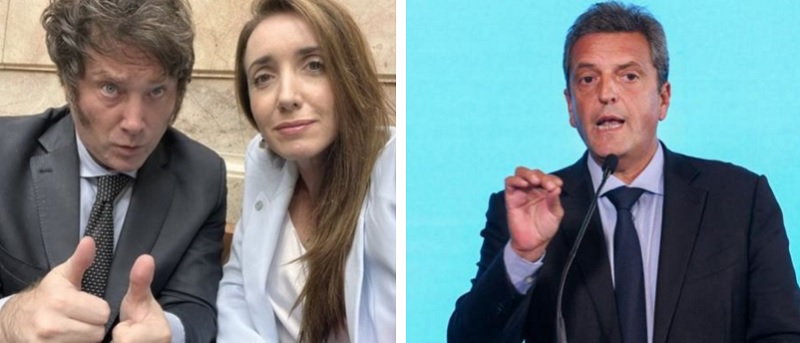
The inflation It overheated after the devaluation applied by candidate minister Sergio Massa at the request of the IMF. So, In the first nine months of the year it has already accumulated an increase of 103.2%, according to the Indec. Another month of high inflation is expected for October; next week the Indec will release the official data.
This price increase is a blow to the pockets of the working class; the most affected are the informal sectors, which lost 44.1% compared to 2016.
Victoria Villarruel stated in the vice president debate in TN that If the presidential candidate Javier Milei reaches the government, he would lower “inflation by a huge amount.” And how would it be? She didn’t say it.
For its part, Sergio Massa in an interview with The Voice He maintained that inflation “is lowered with zero deficit,” that is, with more adjustment.
None of the candidates going to the runoff offers a solution for the benefit of the workers and the popular sectors.
Dollarization: sinking wages
One of Milei’s economic proposals is the dollarization. Last week, the presidential candidate maintained that his project to dollarize the economy is still standing and assured that he will not negotiate his economic proposals with his allies from Together for Change.
Gilding is an adventure that does not know where it ends. First, because there are no dollars to dollarize, as Milei’s advisor, Darío Epstein, recognized in a forum organized by Grupo Clarín. Second, because since there are no dollars, dollarization would imply a brutal devaluation. For example, the consulting firm EPyCA calculated that “no price less than $/U$S 3,000 should be considered ‘expensive’”, in the face of a dollarization scenario. This would accelerate inflation far from lowering it by a “deep dive” as Villarruel assured. Devaluation would further destroy the purchasing power of wages. The measure will also affect small savers, and would be the zero degree of monetary sovereignty because the national currency disappears.
Dollarization had disastrous consequences in the countries where it was applied, such as Ecuador, with increased poverty and loss of wages.
“Zero deficit” and more extractivism
Sergio Massa in an interview on La Voz stated “I believe that the best way to combat inflation is, on the one hand, for the State to only spend what it collects, which is why the proposal is zero deficit.” Thus, the Unión por la Patria candidate confirms that the ongoing adjustment will continue. In the first nine months of the year, primary expenditures fell 5.5% in real terms in relation to 2022, while what is intended for the
Debt interest rose 11.5% in the same period, according to data from the Congressional Budget Office. Among the main cuts are family allowances, energy subsidies, and social programs.
In 2001, Domingo Cavallo also promised “zero deficit” which ended up plunging the country into massive unemployment and led to poverty levels that exceeded 50%.
Meanwhile, Massa added that to confront inflation it is necessary to “export more than we import, that is why the export increase program (…) the generation of a greater amount of exports than imports produces a revaluation of the currency and obviously a decrease of inflation.” But in the first years of the Frente de Todos government there were greater exports than imports. However, the dollars trickled away. The 2020-2022 trade surplus (without taking into account the effect of this year’s drought) was around US$10 billion on average, but There was a drain of foreign currency due to the payments of external debt (public and private), the transfer of profits from large companies to their headquarters and due to capital flight. The next debt maturities anticipate that the bleeding of dollars will continue. Now Massa (and he agrees with the rest of the capitalist parties) proposes greater looting of lithium, gas, and our natural common goods, looting that is offered to allocate dollars to pay the debt. That is why it is necessary sovereign ignorance of debt and reject the agreement with the Fund to preserve dollars to address urgent needs.
Both Massa and Milei agree on continuing at the feet of the IMF, which will imply more inflation, low salaries and a slowdown in the economy.
What does the left propose?
The PTS in the Unity Left Front, together with its candidates Myriam Bregman y Nicolás del Cañoproposed during the electoral campaign a different kind of program to prevent the crisis from being unloaded on the backs of the working class.
The left proposes to confront inflation with measures that are aimed at attacking its causes and emergency measures in the face of the deterioration of purchasing power. In this sense, it is necessary emergency increase in salaries, pensions and social programs, and that is adjusted monthly according to inflation; worker and consumer committees on all essential product chains, from production, distribution to sale in large supermarkets. In this way, large supermarket and hypermarket chains could be prevented from marking prices without control. It is also necessary to impose opening of accounting records to verify the real profits of large companies, as well as avoid the maneuvers they may make to present numbers lower than their real income. Furthermore, measures are required such as nationalization of public services, under the control, administration and management of workers and control of popular users, to access cheap rates; the nationalization of the financial system, creating a single state bank, to stop the outflow of capital (dollars), and avoid a jump in the exchange rate that would accelerate prices even more; the nationalization of foreign trade, which today is in the hands of a few foreign multinationals, under the control of the workers. Big food companies produce to earn by exporting while a huge portion of the population goes hungry. He state monopoly of foreign trade It would allow the entry and exit of foreign currency to be controlled, speculative maneuvers carried out by large employers would be avoided, and it is also necessary to port nationalization which are currently in private hands, and the expropriation of the 4,000 large landowners.
This is a set of measures to provide a response to the working class, which is the one who pays the costs of inflation and permanent crises.
Source: www.laizquierdadiario.com
